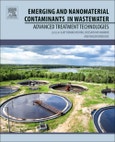Emerging and Nanomaterial Contaminants in Wastewater: Advanced Treatment Technologies describes the state-of-the-art of remediation technologies, such as those involving nanotechnology, filtration devices (e.g. membranes), strategies involving adsorption and precipitation processes, development of new sorbents, nanosorbents, biosorbents, green technology, bio-electrokinetics, degradation of pollutants, advanced oxidative process, oxidative electrochemical and photocatalytic processes, catalytic degradation, and emerging hybrid technologies, such as photocatalyst membrane photoreactors using TiO2. Scientists and researchers in academia and industry will benefit from this comprehensive resource on the fundamental science behind the mechanisms at which wastewater sources can be purified from emerging contaminants.
Please Note: This is an On Demand product, delivery may take up to 11 working days after payment has been received.
Table of Contents
Part 1: General Overview 1. What are the current emerging contaminants, types of nanomaterials, synthesis processes and reactors development? 2. An overview of treatment technologies for the removal of emerging and nanomaterial contaminants from municipal and industrial wastewater
Part 2: Green Technology 3. Transport and fate of the emerging compounds and their by-products in water environment, and their toxicity level: removal by natural process of flocculation, agglomeration, precipitation, colloid formation and sedimentation 4. Long-term performance and feasibility of using constructed wetlands for treatment of emerging and nanomaterial (ENM) contaminants in municipal and industrial wastewater 5. Synthesis of biosorbents from natural/agricultural wastes and sustainable green technology for treatment of metallic nanoparticles in municipal and industrial wastewater
Part 3: Individual Processes 6. Comparison of different nano processes and natural adsorbents such as red mud, steel slag, fly ashes and industrial waste for treating wastewaters laden with metallic nanomaterial contaminants 7.� Composite membranes for removal of emerging organic pollutants and potentially toxic metals from wastewater 8. Advanced oxidation methods such as UV, Ozonation and Fenton Oxidation for the removal of emerging organic contaminants from wastewater 9. Destruction of recalcitrant nanomaterials contaminants in industrial wastewater 10. Removal of emerging pollutants from water through adsorption onto carbon-based materials 11. Nanomaterial-based treatment technologies for remediation of emerging organic pollutants and heavy metals in wastewater
Part 4: Combined Processes 12. Membrane bioreactor and nanofiltration hybrid system for treatment of municipal and industrial wastewater: performance assessment and hydrodynamic analysis 13. Treatment of nanomaterial contaminants in industrial and municipal wastewater by conventional filtration, nanofiltration and reverse osmosis membrane techniques 14. Different polymer-based nanosized engineering material adsorbents and catalyst for treating wastewaters containing inorganic and organic nanomaterial contaminants 15. Treatment of nanomaterial contaminants in wastewater by solar photocatalysis using low TiO2 concentrations, hydrogen peroxide, ferrate(VI) or nanoporous ZnO 16. Combined electrochemical advanced oxidation and enzymatic process for treatment of wastewater containing emerging organic contaminants
Part 5: Conclusion 17. Case studies focusing on the most successful advanced methods/approach for the treatment of nanomaterials in wastewater 18. Removal of emerging contaminates from wastewater through individual and combination of different methods: comparative removal efficiency








